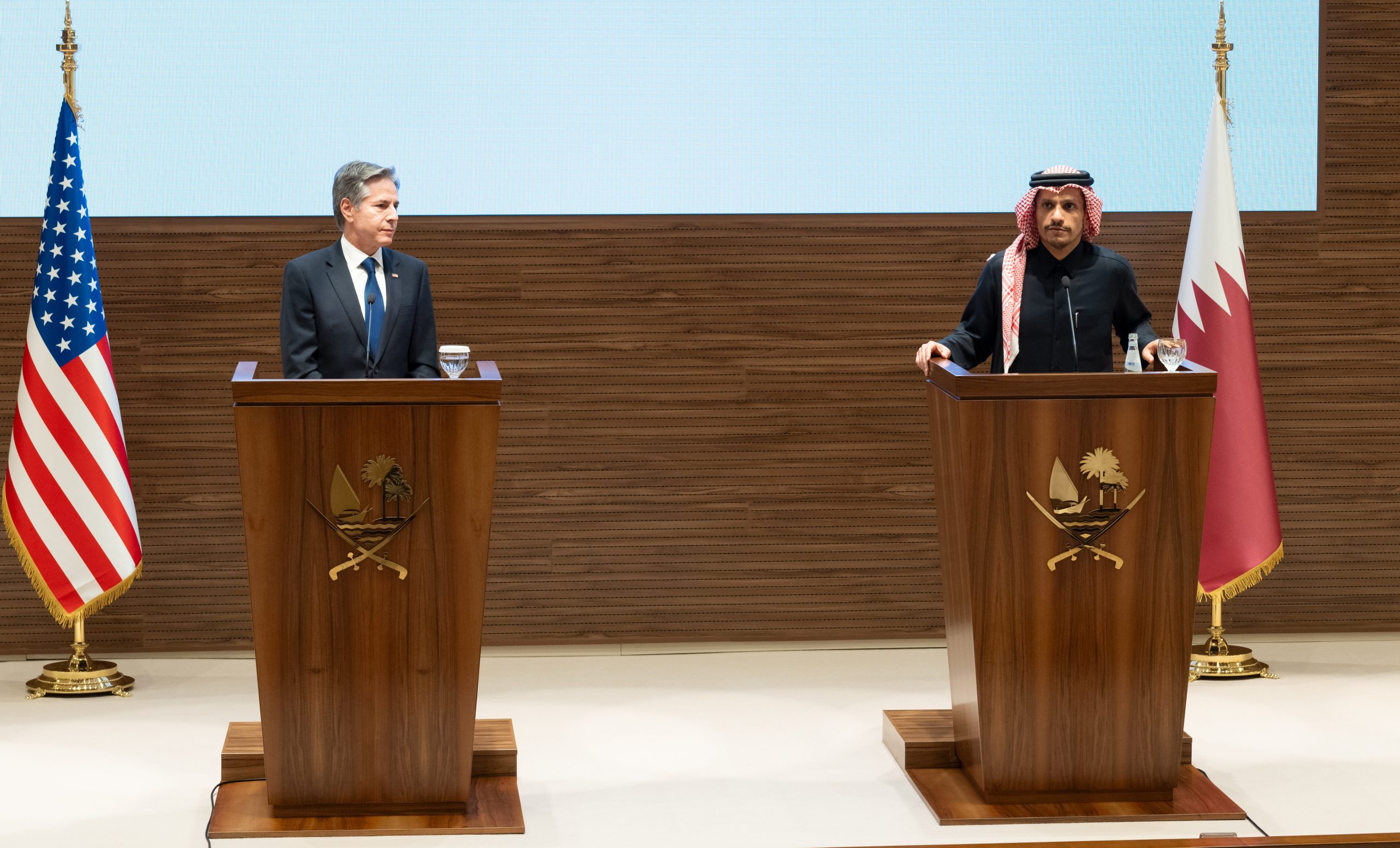The U.S. State Department has twice issued emergency declarations in recent weeks to supply bombs to Israel without undergoing congressional oversight.
U.S. Secretary of State Antony Blinken expressed the imperative for the safe return of Palestinian civilians to their homes, rejecting Israeli calls for mass displacement in Gaza.
Standing alongside Qatar’s Prime Minister Sheikh Mohammed bin Abdulrahman Al Thani on Sunday, Blinken emphasised the crucial role of the United Nations in facilitating the return of displaced individuals as Israel transitions to a “lower-intensity phase” in its genocidal military operations in Gaza.
“They [Palestinian civilians] cannot – they must not – be pressed to leave Gaza,” Blinken insisted.
The top U.S. diplomat emphasised the need for humanitarian assistance and the protection of civilians during the war in Gaza. Despite sorrow over journalist deaths, criticism arose as Blinken was accused of not holding Israel accountable for the killing of journalists in Gaza.
“This is why we are pressing the need – the imperative – not only of making sure that humanitarian assistance can get to people who need it, but that people are protected from harm from this conflict in the first place,” he said.
Twice in the past few weeks, the U.S. State Department has issued emergency proclamations to supply munitions to Israel without undergoing congressional oversight.
Addressing arms deliveries to Israel, Blinken claimed that all U.S. weapons come with conditions to respect humanitarian law. Blinken acknowledged Israel’s right to target Hamas, but he did stress the “imperative” to protect civilians, especially as military operations phase down.
Qatar’s Prime Minister Sheikh Mohammed spotlighted the global desensitisation to civilian suffering in Gaza, calling it a “big test for our humanity.”
Since October 7, Israel has killed at least 22,835 Palestinians in Gaza while injuring 58,416 others, according to the latest figures by the Strip’s health authorities.
Sheikh Mohammed, who is also the country’s foreign minister, also addressed the impact of the assassination of Hamas deputy political leader Saleh al-Arouri in Beirut last week on Qatar’s mediation efforts.
The talks centred around a ceasefire appeared to be at a deadlock following the expiration of a week-long pause on December 1.
The mediation of Qatar, alongside Egypt, had resulted in the temporary truce that lasted between November 24 and December 1 following two extensions.
The pause led to the release of at least 110 Israeli and foreign captives from Gaza, according to a Doha News tally. As part of the deal, Israel released 240 Palestinian women and children from Israeli prisons.
Israel has since rejected all attempts at reaching a ceasefire in Gaza and persisted in its genocidal war on the Strip.
Despite challenges, Qatar remains engaged in negotiations to reach a ceasefire and secure the release of captives, the Gulf country’s prime minister assured during Sunday’s press conference.
Blinken, on a week-long diplomacy tour in the Middle East, seeks to address the “moment of profound tension” amid Israel’s three-month-long war in Gaza.
Concerns about a potential regional escalation are heightened as Israel and Hezbollah exchange cross-border fire, resulting in the deaths of dozens of Lebanese civilians and over 140 Hezbollah members.
Meanwhile, Houthi rebels in Yemen have fired missiles at Israel and targeted multiple commercial ships in the Red Sea. Blinken mentioned the global impact of these attacks, which he said have lead to increased shipping costs and delays.
In response, the U.S. has formed a multinational maritime force to safeguard shipping lanes.
Washington has been a vocal supporter of Israel’s right to self-defence since the beginning of the brutal war on Gaza, where 70% of deaths are Palestinian women and children.
On December 8, Washington used its veto power to block a UN Security Council resolution over a ceasefire in Gaza while militarily backing Israel.
Washington had bypassed Congress for the second time on December 29 to approve an estimated $147.5 million in weapons for Israel.
This came after the U.S. House of Representatives passed a Republican bill to provide $14.3 billion in aid to Israel on November 2.







